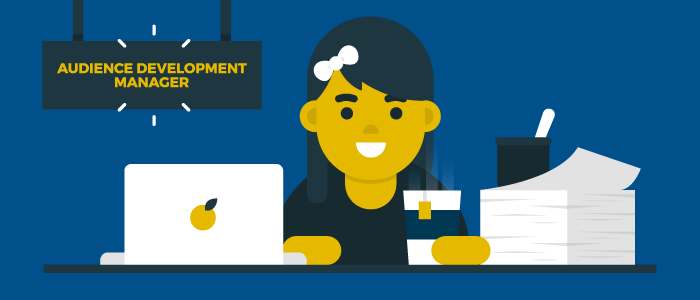
Multiplatform publishing is the key to publishing success, and audience development is the job that gets you there

Sixteen years later, I can still remember the day a large publishing company, who’d been negotiating with my marketing services firm to revive a struggling magazine it owned, decided to cut its losses and shut the magazine down instead.
Twenty-six people, whose jobs we had been hoping to save with our services, got some very bad news that day. When I told my staff, we sat there looking around the conference table at each other, reflecting for a moment on what it was like for that magazine’s employees.
These days, the death of a legacy print publication is all too common. And the job market is in far worse shape for former editors, designers, marketers and advertising staff than it was then. No wonder publishers are struggling to remain relevant by transitioning to digital – yet there are still no guarantees of success or even survival in this complex, evolving new marketplace.
Mequoda’s only purpose in life is to prevent any other publishing company from going out of business, ever.
[text_ad]
You may have heard our method for success called the Agora Method, or the Rodale Method, or any number of other names. Maybe you looked into it and couldn’t figure out on your own exactly how they’re generating 20-50% of their revenues online. The Mequoda Method is hugely successful, yet largely unknown in publishing circles. Publishers such as Interweave, The Motley Fool, Consumer Reports, Harvard Law School, Business & Legal Resources and more use it to earn as much as 50% of their revenues online. But hundreds more publishers remain unaware, and struggle to fully monetize the great content they produce.
A perfect picture of multiplatform publishing that represents the companies above include:
A special-interest B2C publisher who now uses the Internet as its primary source of new magazine subscriptions sales.
A large B2B publisher who now uses the Internet to drive more than half its revenue selling subscriptions to six paid content websites.
A major university who now routinely sells out its adult education events using the Internet as its primary marketing channel.
What do all these content producers have in common that you’re missing? They all have aggressive audience development programs fueled by the Mequoda Method. If you’ve ever subscribed to a free email newsletter, clicked on a link and bought a product, you’ve experienced the “method.” The question is, do you know how to get all your potential customers to subscribe, click and buy from you? If not, why don’t you find out how to do it from us?
How to hire a Mequoda Method-worthy audience development director
There are only three jobs we suggest outsourcing as a publisher: strategy, technology, and analytics. Audience development is not one of them.
To hire your next Audience Development Director, first, read the best audience development job description we know of.
Next, if you’re a publisher and you’re hiring an Audience Development Director, the first thing you should look for on their resume, is participation in and certification from the Mequoda Institute (formerly titled Mequoda Intensive).
Finally, use the following three criteria to make your hiring decisions.
Do they have the experience to run audience development?

If you have a dedicated team member running audience development, the next question is, “Do they have the experience to build the business processes necessary to achieve the goal?”
As my colleague Bob Brady is fond of pointing out, we live in an age where established business processes are just being established. When Bob and I entered the publishing business some decades ago, the business processes for building an audience and distributing content successfully and cost-effectively had long been established. Successful publishers all had the same organizational structure, with the same business processes, and the same business goals.
That’s not saying that everyone executed equally. That never happened. And there are always newcomers to the industry that simply have not learned the established business processes that others are using to succeed. But the situation we face today is much more complex: Best practices for creating, delivering, and marketing our content are in flux and evolving. We do have a clear set of best practices for audience development that revolve around using free content, organic search, and email broadcasting to build and retain a robust online audience. But for most publishers, this system must be integrated into a larger publishing plan and organization. That’s the hard part.
Do they have the authority to do the job?

Once it’s clear that someone is in charge of audience development and that they have the experience to build a business process that’s working for other successful publishers, they must have the authority to execute.
Often times the audience development manager, online editor, or other team member with primary responsibility for audience development is buried in an organizational structure and prevented from doing their job by more senior members of the team who are focused on other priorities. This is not to say that those other team members are behaving badly. Sometimes they’re doing that. Other times they’re simply struggling to do their own job, meet their goals, and cope with their own evolving work processes. Often they’re simply unaware of the differences between publishing content for audience development versus publishing content that sells magazines, books, videos and other premium information products.
Website editing for audience development is different. The skills required to be an effective magazine editor, book editor, or video producer are not the skills necessary to be a successful audience development editor.
In a nutshell, online audience development is about posting content that gets found, gets ranked by search engines, and stays on page one of the search engine results for a prolonged period of time. A post that accomplishes this feat is a blockbuster post that’s often responsible for generating as much as one or two percent of the website’s total traffic.
Blockbuster posts accumulate audience over time and generate qualified website arrivals for months and often years. The creation, nurturing, and maintenance of these posts is not something that a magazine, book, or video editor knows how to do. It’s the heart and soul of website editing with a goal of building a large and stable audience of qualified users.
Do they have the tools to succeed?

When a website publisher asks me to help them increase website traffic and build a loyal online audience, the first question I ask is, “Who runs audience development for your organization?” I get a wide variety of answers. At smaller independent publishers, the answer is often “I do.” At larger established publishers, the answer is often, “Our audience development director.” For those publishers with an answer, I’ve also been told it’s the editor, webmaster, chief marketing officer, marketing director, and almost every other job title inside the organization except the cat. As often as not, I get a blank stare.
If you intend to partner with search engines as your primary audience development strategy, there is an established set of business processes that you can use, refine, and customize for your audience.
As one of our Gold Members is fond of saying, “This is not the only audience development system that works, but it is a system and it does work.” Many online publishers rely on other audience development sources including television, paid search and banner advertising to build an online audience. Many larger publishers use both an organic marketing system, and one or more of the above in combination.
I won’t tell you that organic marketing is the only way to build an audience. I will tell you that it’s cost-effective and long-lasting. And like most things in life, if you want to do it, you will need to do it well in order to succeed.
Our credentials: The Mequoda Method
The Mequoda Method consists of a proven, fully integrated, low-cost, high-efficiency system which can be powered by our Haven Nexus CXMS that helps publishers build incredibly successful online publishing and marketing operations. It’s a system we first deployed in 1997 and have been modifying and perfecting since.
You may even be using parts of our system already. But while many of the techniques are simple, the execution is complex. We’ve seen far too many publishers try to go it alone, cherry-picking among our strategies and skills. These publishers are invariably surprised by their lack of success; the moving parts Mequoda has identified aren’t easily separated from each other. And lacking the understanding of how they work together all but guarantees disappointment.
Final thoughts on hiring
If you want something done well, make it the only thing that someone does. After launching and running dozens of legacy and digital organizations, I’ve learned the hard way that giving people more than one priority often results in one or more of those priorities being done badly. If you want to increase website traffic, make that goal someone’s first priority, and if possible, their only priority.


